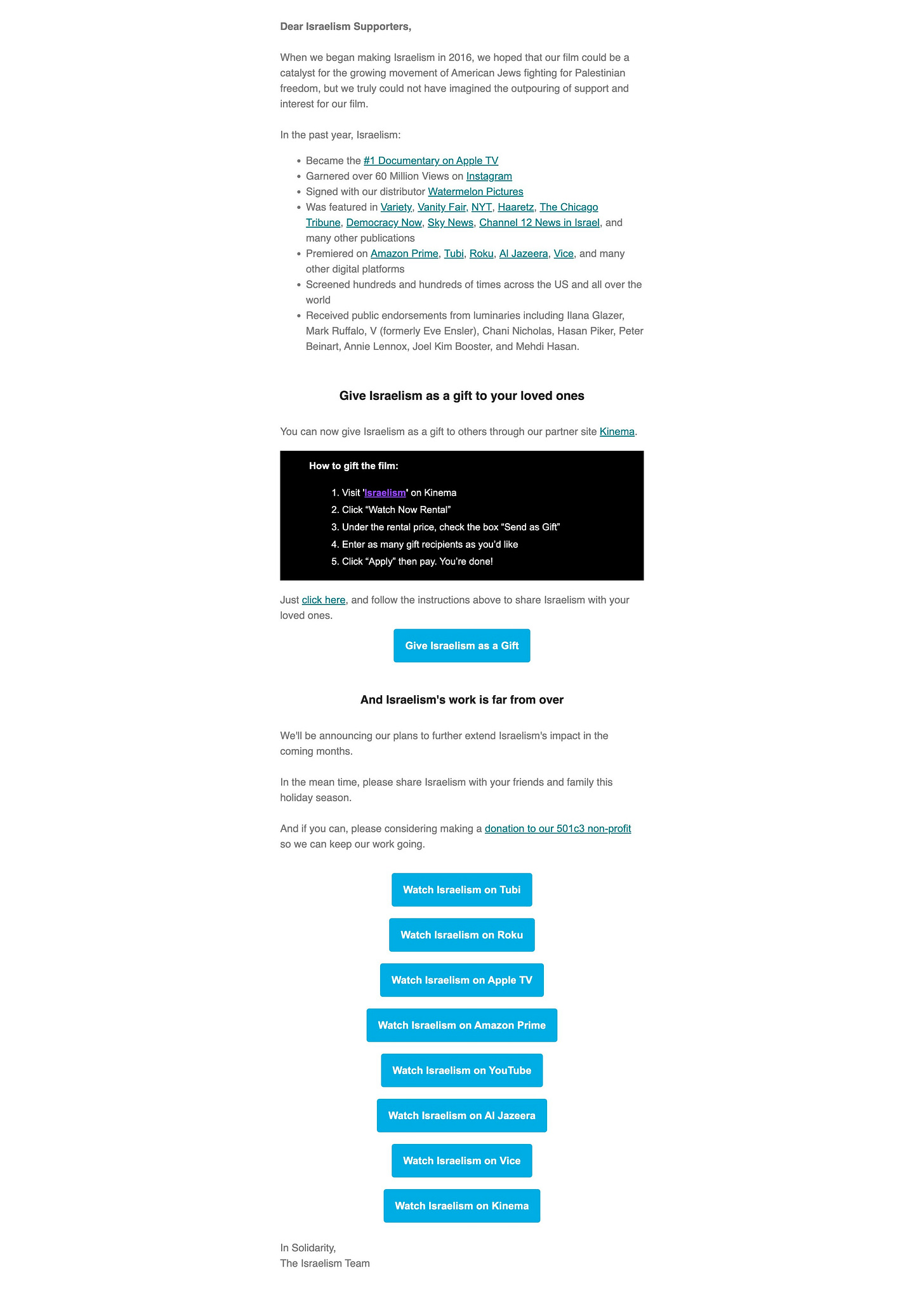How a Documentary Broke All the Rules and Found Great Success
An indie film's unconventional distribution journey from cancelled screenings to #1 on Apple TV.
“The thing about independent film distribution is that there's a formula everyone tells you to follow. But what happens when that formula doesn't work for your film? That's when you have to get creative.”
It was October 2023. Universities were canceling scheduled screenings. Distribution platforms were saying “come back next year.” Israelism—a documentary by directors Erin Axelman and Sam Eilertsen exploring the complicated relationship between American Jews and Israel—had suddenly become both too relevant and too risky.
Now, two years after Israelism’s February 2023 Big Sky Documentary Film Festival premiere, co-producer Pulkit Datta offers powerful lessons for independent filmmakers facing their own distribution challenges.


After October 7th, rather than “sitting tight,” as many advisors they spoke with suggested, the Israelism team chose to meet the moment, starting with limited virtual screenings. The result? A groundswell that has grown to millions of viewers across multiple platforms and led to Israelism becoming the #1 documentary on Apple TV for nine consecutive days and in the Top 10 for nearly three months. All that despite breaking every rule in the film distribution playbook.
Here's their story—and the four tactical lessons you can apply to your own film's journey.
Distribution Timeline:
February 2023: Premiered at Big Sky Film Festival
Spring-Summer 2023: Continued limited festival run despite rejections from major festivals, won Best Documentary at Arizona International and Tallgrass Film Festivals and Audience Award for Best Documentary at the San Francisco Jewish Film Festival, the nation’s oldest Jewish festival
June 2023: Released a teaser in June 2023 that went viral
September 2023: Announced a 60+ campus tour (right before Oct 7) and released a main trailer with the announcement.
October 2023: First virtual screening on Kinema (limited capacity 1,500) with a virtual Q&A. Established a weekly cadence
November—December 2023: Holiday Season Limited Drops on Kinema
Thanksgiving: First limited 4-day VOD release
Hanukkah: Second limited VOD window with similar approach
Christmas: Third limited VOD window with similar approach
Early 2024: Film widely available on Kinema for partner screenings and VOD
March 2024: Signed with Watermelon Pictures (North America) and Sideways Film (International):
Kept community screening rights
June 2024: Released on Apple TV, Amazon Prime, Google Play and other TVOD platforms (had to remove briefly from Kinema)
Mid-2024: Released on other mainstream platforms. And returned to Kinema after launch. Now available everywhere.
Late 2024: Al Jazeera and Vice launch on YouTube
2025:
Chile screening tour
Ongoing: Still receiving regular bookings through Kinema
International: Expanded to international territories through the distributor (e.g., recently on Al Jazeera)
LESSON 1: Ditch the conventional approach if it doesn’t serve you.
When Israelism premiered at Big Sky Film Festival in February 2023, the team had the traditional playbook in hand. Despite festival rejections due to the film's controversial subject matter, they had built partnerships with student organizations across the country for campus screenings.
Then came October 7. Universities cancelled screenings. Their carefully constructed plan crumbled overnight.
"In this moment when our story was most relevant, everyone was telling us to be quiet."
The conventional response was clear: wait it out. But they felt that their film's moment of crisis was also its greatest moment of relevance.
Step 1: Don’t accept your roadblock(s).
The team was not deterred by attempts to censor Israelism or brand it as radical. Despite the cancelled screenings, they recognized the heightened audience interest as an opportunity to have conversations even when it is hard. People who had planned to attend now-cancelled events were actively reaching out, asking how they could watch the film.
Step 2: Start with a small, measurable experiment.
Rather than making a dramatic all-or-nothing decision, the team negotiated a compromise: one virtual screening on Kinema as a test.
The idea was initially met with some pushback.
“Why would we put it online when it's a brand new film? This is what filmmakers are taught—don't go online first because it ruins your chances for everything else.”
But Datta had previous experience using Kinema for a smaller film. He knew it would work well for Israelism—they just needed proof. The team agreed to one virtual screening, limiting the audience size to 1,300. They also created an email waitlist to build their audience and have a measure of demand for their film.
Pro tip: Ask yourself what's the smallest experiment you can run to test a new distribution approach?
Step 3: Let audience response guide your next move.
The beauty of starting small is that you can let real audience data—not industry assumptions—guide your next steps. For Israelism, that first screening filled up so quickly they chose to increase the capacity from 1,000 to 1,300 viewers—and it still sold out completely.
LESSON 2: FOMO creates demand.
When you don't have millions for marketing, how do you create buzz and urgency around your film? The Israelism team found that limiting access—rather than maximizing it—was the key to building demand.
This wasn't part of some grand strategy at first but when their 1,000-viewer cap filled almost immediately, and their email list was growing fast, they discovered the power of FOMO (fear of missing out).
Step 1: Create access with clear limitations.
The secret is to offer access—but with deliberate constraints that create urgency:
Cap your audience size: Start smaller than you think necessary (you can always increase)
Set clear time limits: Decide how long your film will be available
Communicate these limitations explicitly: Make sure your audience knows these are real constraints
After their first successful screening, the team established a weekly cadence of virtual screenings, each announced only one day before to create urgency. They gradually increased their caps to over 2,000 while still maintaining exclusivity.
Pro tip: When people couldn't get a ticket, they directed them to join their mailing list for future opportunities—turning disappointment into a list-building opportunity.
Step 2: Create "drops" around cultural moments.
The team built on their success with a limited-time VOD strategy around holidays:
Thanksgiving 2023: A four-day VOD release on Kinema
Hanukkah 2023: A similar limited window
Christmas 2023: A third holiday-focused drop
Their messaging evolved to emphasize timely relevance. e.g., "Watch it now with your family and have those difficult conversations."
The critical factor? Following through on their promises.
“We promoted it saying, 'Watch it now, or you're going to miss it.' And we actually took it down as promised. That built trust.”
Step 3: Make each screening a unique community experience.
Every Israelism virtual screening included live Q&As with different guests to create unique, can't-miss experiences. The team used Kinema's chat feature to engage directly with viewers.
“The chat was incredible for community building. People shared personal stories and connections. We also gathered valuable data when people would say things like ‘I want my family to watch this’ or ‘My community needs to see this.’”
This real-time engagement served multiple purposes:
Built community around the film
Provided valuable audience insights
Generated leads for future screenings
Created a feedback loop for refining their messaging
“We would always make ourselves available. We'd share our contact information during screenings on the chat. People would reach out sharing their thoughts, and we would always respond to that. When people would ask, ‘Can I read up more about this somewhere?’ we would share links and resources—books, articles, other films.”
LESSON 3: Digital and physical screenings can complement each other. Success in one drives interest in the other.
Defying conventional film distribution wisdom, the Israelism team discovered that digital and physical screenings don't cannibalize each other—they fuel each other.
As their virtual screenings gained momentum, something unexpected happened: the demand for physical screenings only grew.
“The buzz was back. Our virtual screenings pushed everything open again. Student organizations who had cancelled of postponed came back saying, ‘Okay, now let’s do our screenings again.’”
Step 1: Build initial buzz in the most accessible channel.
For Israelism, the most accessible channel was digital. When venues closed their doors, digital screenings created:
Immediate access for eager viewers
Media opportunities when traditional venues weren't available
Buzz that eventually influenced hesitant hosts / exhibitors to reconsider
Opportunity to build a movement
Step 2: Let success in one channel create FOMO in others.
The Israelism team didn't need to convince venues to reconsider—the venues came to them after seeing the online buzz. Nobody wants to miss out on something that's clearly gaining momentum. Success in one channel creates curiosity and demand in others.
Pro tip: Document and share the success of your initial efforts (e.g., attendance numbers, audience reactions, media coverage) to create interest in other distribution avenues.
Step 3: Use tools to drive your expansion strategy.
Initially, the team kept physical booking management separate from their Kinema efforts. But as volume grew, they centralized everything on Kinema.
“We were taking up too much time just replying to people individually. So we transitioned everything to Kinema on all fronts. It streamlined everything.”
They also used Kinema's geographic data to inform their strategy:
They started with selective geo-blocking to create separate pages for different territories while exploring international rights
They gradually opened territories based on demonstrated demand
They used location data to target physical screenings in high-interest areas
“The Kinema dashboard shows you where viewers are coming from. If someone mentioned they were in Arizona and wanted their community to see it, we could immediately follow up about organizing a local screening there.”
This data-driven approach allowed them to focus their limited resources on locations with proven interest—a much more efficient strategy than blanket outreach.
LESSON 4: Traditional distribution can still come later.
After all their success with direct-to-audience distribution, the Israelism team did sign a traditional distribution deal—but on their own terms, with their grassroots success as leverage.
People think you can't have your film available online and then expect a distributor to pick it up. Yet in March 2024, after building a substantial audience, the Israelism team signed with Watermelon Pictures, who helped them expand to mainstream platforms like Apple, Google, Amazon, Al Jazeera, and even YouTube. But they negotiated to keep the film on Kinema as well to continue the in-person and virtual screening events which are working well for them.
Step 1: Build leverage through proven audience demand.
The Israelism team didn't have to convince Watermelon Pictures of their film's potential—they had already demonstrated it through concrete results.
“When they approached us, their pitch was actually: ‘What you've done so far is amazing to build this grassroots audience. We want to help take you to the next level with the VOD platforms that people already know about.’”
This inverts the traditional power dynamic with distributors. Instead of begging for attention, you're bringing proven value to the table.
Step 2: Find partners that really care about your film.
The alignment with Watermelon Pictures went beyond business—there was mission alignment. The distributor understood what they were trying to do with the film on a deeper level.
“The only compromise we made with them was taking it off Kinema for two months. It wasn't even pushback—it was mostly from a marketing point of view for them, saying that if we're going to hype up the film releasing on Apple and Amazon, it has to have some level of exclusivity.”
Step 3: Embrace platform diversity instead of exclusivity
The most radical aspect of their approach was challenging the idea that availability on one platform necessarily cannibalizes another. The results speak for themselves:
The film became the #1 documentary on Apple TV for nine consecutive days
It remained in Apple TV's top 10 documentaries for three months
It appeared on Amazon's homepage recommendations
It has over 1M views on YouTube
All while continuing to perform well on Kinema
Screenings (licensed and ticketed): 250+
Rentals: 13K+
“Different avenues reach different types of audiences. Someone who only uses Apple TV may never have heard of Kinema, and that's fine. Instead of trying to redirect the entire world to one platform, we tapped into multiple built-in audiences.”
BONUS: Your film, your rules.
“We literally broke all these rules and proved they could be broken. Distribution should serve your film's purpose and audience, not the other way around. When everyone is telling you to follow the conventional path, that's exactly when you should be asking: is there a better way that serves my film and my audience? There usually is.”
More from Pulkit Datta:
Pulkit is part of the non-profit production company Tikkun Olam Productions, which also consults filmmakers on their impact campaigns and distribution strategies. You can learn more here.
Pulkit in conversation with Kinema’s CEO,
.
If you’re finding this newsletter valuable, share it with a friend, and consider subscribing if you haven’t already.





